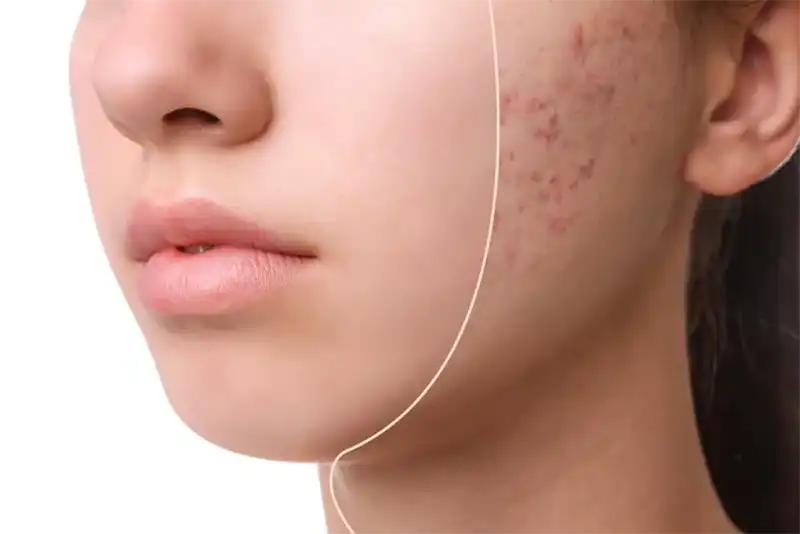Acne is not only a problem for teenagers. Many adults also suffer from breakouts on their face and body. Acne can affect your confidence, your social life, and even your health. But what causes adult acne, and how can you treat it effectively?

The main cause of adult acne is the same as teenage acne: excess oil production by the skin glands, which clog the pores and create an environment for bacteria to grow and cause inflammation. However, adult acne can also be influenced by other factors, such as:
- Hormonal changes: Women are more likely to have adult acne than men, especially during their menstrual cycle, pregnancy, menopause, or when they use hormonal contraceptives or therapies. Hormones can stimulate the skin glands and increase oil production.
- Stress: Stress can also affect your hormones and cause your body to produce more cortisol, a hormone that can increase inflammation and oil production. Stress can also weaken your immune system and make you more prone to infections.
- Diet: Certain foods can worsen acne, such as dairy products, refined carbs, sugar, and processed foods. These foods can raise your blood sugar and insulin levels, which can stimulate your hormones and inflammation. On the other hand, foods rich in antioxidants, omega-3s, zinc, and vitamin A can help lower inflammation and improve your skin health.
- Medications: Some medications can cause or aggravate acne, such as steroids, lithium, anticonvulsants, and some antidepressants. If you think that your medication is causing your acne, talk to your doctor about possible alternatives or adjustments.
- Skincare products: Some skincare products can clog your pores and cause acne, especially if they are too oily, greasy, or comedogenic. Look for products that are labeled as non-comedogenic, oil-free, or water-based, and avoid products that contain alcohol, fragrance, or harsh chemicals. Also, make sure to wash your face twice a day with a gentle cleanser and use a moisturizer that suits your skin type.
- Genetics: Some people are more genetically predisposed to acne than others, due to factors such as skin type, pore size, and sebum composition. If your parents or siblings have acne, you are more likely to have it too.
The treatment of adult acne depends on the severity, type, and cause of your acne. Some general tips for treating adult acne are:
- Use over-the-counter products that contain benzoyl peroxide, salicylic acid, or sulfur. These ingredients can help kill bacteria, unclog pores, and reduce inflammation. Start with a low concentration and gradually increase it if needed. Be careful not to overuse these products, as they can dry out or irritate your skin.
- Consult a dermatologist if your acne is moderate to severe, persistent, or resistant to over-the-counter products. Your dermatologist may prescribe topical or oral medications, such as antibiotics, retinoids, or hormonal therapies, that can target the underlying cause of your acne and prevent scarring. Your dermatologist may also recommend other treatments, such as chemical peels, laser therapy, or light therapy, that can improve your skin texture and appearance.
- Avoid picking, popping, or squeezing your pimples, as this can cause more inflammation, infection, and scarring. Instead, apply a warm compress or an ice pack to reduce the swelling and pain. You can also use a spot treatment that contains benzoyl peroxide, salicylic acid, or tea tree oil to dry out the pimple and speed up the healing process.
- Protect your skin from the sun, as sun exposure can worsen your acne and cause hyperpigmentation and premature aging. Use a sunscreen that is at least SPF 30, non-comedogenic, and broad-spectrum, and reapply it every two hours or after sweating or swimming. You can also wear a hat, sunglasses, and protective clothing to shield your skin from the sun.
- Manage your stress levels, as stress can trigger or exacerbate your acne. Try to find healthy ways to cope with stress, such as exercise, meditation, yoga, breathing exercises, hobbies, or social support. You can also seek professional help if you feel overwhelmed or depressed by your acne or other life issues.
- Eat a balanced and nutritious diet, as diet can affect your skin health and acne. Avoid foods that can trigger or worsen your acne, such as dairy products, refined carbs, sugar, and processed foods. Instead, eat more foods that can help prevent or reduce your acne, such as fruits, vegetables, whole grains, lean proteins, nuts, seeds, and healthy fats. You can also take supplements that can benefit your skin, such as vitamin A, vitamin C, vitamin E, zinc, and omega-3s, but consult your doctor before taking any supplements.
- Drink plenty of water, as water can help hydrate your skin, flush out toxins, and regulate your hormones. Aim to drink at least eight glasses of water a day, or more if you are active or live in a hot or dry climate. You can also drink herbal teas, such as green tea, chamomile tea, or spearmint tea, that can help calm your skin and reduce inflammation. Avoid drinks that can dehydrate or irritate your skin, such as alcohol, caffeine, or sugary drinks.
Adult acne can be frustrating and embarrassing, but it is not a hopeless condition. With proper care, treatment, and lifestyle changes, you can improve your skin and your confidence. Remember that you are not alone, and that there are many resources and professionals that can help you overcome your acne and achieve clear and healthy skin.